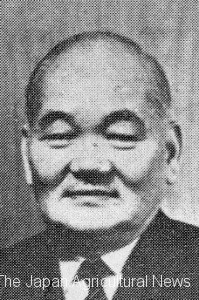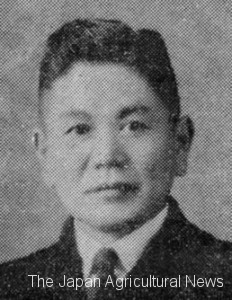Overcoming the weaknesses by amendment of the law
Ensured foundation promoted rapid progress
Since 1948 when born in Hokkaido, nokyo-kyosai (agricultural cooperatives mutual insurance) business had suffered the incessant pressure from the private commercial insurance industry and nogyo-kyosai (agricultural insurance) organization. The kyosai (mutual insurance) business was in compliance with the provisions of Article 10, Paragraph (1), Item8 of nokyo (agricultural cooperatives) law. However, the contents of contract and rights & obligations had been carried out based on voluntary guidelines between the cooperatives members and nokyo. There was a remarkable difference from detailed supervision against nogyo-kyosai (agricultural insurance) organization and commercial insurance companies.
Commercial insurance companies had been poked Its weaknesses, spreading false rumors as follows; “It will collapse immediately,” “Money will not be returned.” It was needed to amend nokyo law in order to be directed and supervised in firm legislation. It was Yoshinori Yamanaka, senior managing director of Zenkyoren, who had run in the front line for such amendment.
Yamanaka went to the canteen in the parliament with the persons well familiar with the circumstances of the National Assembly. The purpose was to look for lawmakers who showed the understanding for nokyo. At that time, there was one lawmaker who had been involved in the welfare business for farmers movement. The lawmaker was Yojuro Kaneko (1901 – 1954), member of the House of Representatives, elected from Gunma prefecture.
Kaneko was elected at the age of 49 years old for the first time. When Yamanaka met him, he had served as vice chairman of the Committee of Agriculture and Forestry.
In October, Yamanaka and Kaneko started off towards the amendment of nokyo law. At that time, the power of ruling party and opposition parties was more or less balanced. Both of ruling Liberal Party and the opposition left-wing Socialist Party had majority members related to nogyo-kyosai (agricultural insurance). If they actioned, the amendment bill of nokyo law would have been killed.
Kaneko aimed for just the legal provisions of nokyo-kyosai (agricultural cooperatives mutual insurance) business. But the amendment bill of nokyo law had also contained “Proposal of redistricting agriculture organization, mainly focusing on establishment of Central Union of Agricultural Cooperatives.” Noticed of this, Kaneko went to the Liberal Party and entered into negotiation. “We agree with proposal of Central Union of Agricultural Cooperatives. Instead, please admit the submission of the bill of lawmakers on nokyo-kyosai (agricultural cooperatives mutual insurance) business.”
Kaneko suggested Kazuo Koeda, elected from Okayama prefecture, as the key person able to unite the agriculture related committee members. Kaneko advised to Yamanaka from Tottori prefecture saying, “You should request the cooperation to Koeda elected from your neighboring prefecture.” That day, Koeda was having a game of “go” near the Houses of Parliament with Saburo Hirano, vice minister of Ministry of Agriculture and Forestry. “I have something to want to talk about …”. Yamanaka lowered the deep head, but Koeda didn’t raise his face. Looking at Yamanaka’s pathetic face, opposite player Hirano prompted Koeda to reply saying, “I do not care.”
Moved to a separate room, Yamanaka said, “We would like to amend nokyo law so as to ensure nokyo-kyosai (agricultural cooperatives mutual insurance) business.” Before Yamanaka finished saying, Koeda opened his mouth and said, “The home village of Kazuji Shimoyama, managing director of “nogyo-kyosai (zenkoku-nogyo-kyosai-kyokai (National Agricultural Insurance Association))”, is the same as mine.” It seemed that Koeda was not able to betray Shimoyama having the same hometown. Yamanaka parted discouraged.
After a few days, Koeda contacted to Yamanaka. Immediately he went out. Koeda was waiting for him with solemn expression. Yamanaka prepared himself while thinking, “Again I shall be refused?” Koeda started saying, “I think that nokyo law should be amended as you say. I would like to do as well as I can do.”
Suppressing the feelings to want to dance for joy, Yamanaka said, “Whom do you recommend as the other persons among the agriculture related committee members who can cooperate us…?” He asked the question along with direction by Kaneko. If three lawmakers of Liberal Party agreed with this side, the bill would be passed through getting agree of majority. It was Kaneko’s forecast. “Then …” Koeda didn’t dislike the question and raised the two lawmakers’ name, Zenichiro Sato and Yonosuke Sato. Both first name was accidentally the same, but two persons were familiar with the agricultural policy.
Receiving report, Kaneko said, “Never hesitate to do good. Go to meet with them immediately.” Because it was the end of the year, the National Parliament had been closed. Lawmakers had stayed in the constituency. Yamanaka hopped the train. He headed the Fukushima Prefecture. Knowing the story that Kaneko had introduced him, Zenichiro Sato, president of keizairen (prefectural purchase and sales federation of agricultural cooperatives) of Fukushima, responded, “I would like to do as well as I can do.” Home of Yonosuke Sato was the sake brewery in Furukawa, Ibaraki prefecture. At that time the sake brewery was in the busyness of the end of the year, but Yamanaka was immediately guided to guest room, and could get promise of cooperation.
Koeda and two Sato became supporters. Kaneko invited Yamanaka and firmly said, “That’s all right. The bill can be passed if voted.”
Amendment bill of nokyo law was passed on 8 June 1954 and came into effect on 29 June. As a result, the conventional provision of “facility regarding kyosai (mutual insurance) for agricultural disaster or other disasters” was changed into the comprehensive provision defined such as “facility regarding kyosai (mutual insurance).” Further, nokyo law clearly provided the “Approval system run by the administrative agency regarding the setting, change, or abolition of kyosai (mutual insurance) provisions.” The biggest concern was fundamentally solved since the start of nokyo-kyosai (agricultural cooperatives mutual insurance) business so that the foundation of nokyo-kyosai business was established.
About 70 years have passed since nokyo law contained provisions of “kyosai (mutual insurance).” At the end of 2015, contract amount of long-term kyosai (mutual insurance) is 273,682.4 billion yen. Nokyo-kyosai (agricultural cooperatives mutual insurance) business has one of the world’s leading business scale.
(end)
Reference = National Mutual Insurance Federation of Agricultural Cooperatives ed. “Evolution History of Agricultural Cooperatives Mutual Insurance”, “Record of JA insurance of founding period Now looking back to the origin” the Federation, Yoshinori Yamanaka “Until establishment of Zenkyoren” Cooperatives social gathering, Kazuo Tomiya “Kaneko Yojuro Den (Biography of Yojuro Kaneko)” Gunma publisher, JA Kyosairen “Present state of JA Kyosairen 2016″ JA Kyosairen



